Beirut explosion death toll rises to 135 as 5,000 wounded: Live
Information minister says army will oversee house arrest of those responsible for storage and guarding at Beirut port.
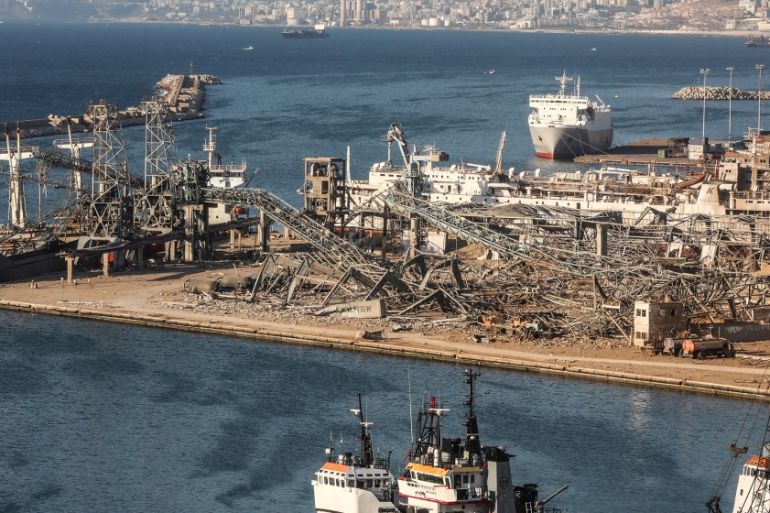
Lebanon’s cabinet declared a two-week state of emergency in the capital city and handed control of security in the capital to the military following a massive explosion in Beirut that killed at least 135 people and injured 5,000 others.
The explosion on Tuesday sent shockwaves across the city, causing widespread damage as far as the outskirts of Beirut.
Keep reading
list of 4 itemsParallel seasons: How Lebanon hides from reality
Lebanon’s FIBA World Cup journey is about much more than basketball
Justice for the Beirut blast can help avert Lebanon’s collapse
Officials said they expect the death toll to rise further as emergency workers dig through the rubble to search for survivors.
Beirut’s city governor Marwan Abboud said up to 300,000 people have lost their homes and authorities are working on providing them with food, water and shelter.
The cause of the explosion was not immediately clear. Officials linked the blast to some 2,750 tonnes of confiscated ammonium nitrate that were being stored in a warehouse at the port for six years.

Here are the latest updates:
For Thursday, August 6 updates, click here.
Wednesday, August 5
23:11 GMT – 10 of 11 missing Filipino seafarers near Beirut blast site found safe
The Philippine embassy in Lebanon has reported that 10 of the 11 seafarers, who were intially reported missing following the massive blast in Beirut, have been found.
According to a statement from the Philippine government, the seafarers suffered minor injuries and are now being looked after their shipping company. One seafarer remains missing.
Earlier, the Philippine government reported at least two Filipino workers were killed and six others injured in the explosion.
20:50 GMT – World Bank says ready to mobilise financing for Lebanon blast recovery
The World Bank Group said it stands ready to assess Lebanon’s damage and needs after a devastating Beirut port explosion and work with the country’s partners to mobilise public and private financing for reconstruction and recovery.
The World Bank said in a statement that it “would be also willing to reprogram existing resources and explore additional financing to support rebuilding lives and livelihoods of people impacted by this disaster.”
20:15 GMT – Support for hospitals and trauma response is a top priority: UN
The United Nations is working closely with the authorities in Lebanon to support ongoing response in the aftermath of the massive explosion, UN Deputy Spokesperson Farhan Haq told reporters.
“The World Health Organization is working closely with the Lebanese Ministry of Health to conduct an assessment of hospital facilities in Beirut, their functionality and needs for additional support, particularly amid the COVID-19 pandemic”, he said.
“Specialists are being dispatched to Beirut at the moment to assist in the emergency response, both from the United Nations and multiple Member States. Experts are en route to support urban search and rescue operations. Teams are also equipped to conduct rapid assessments about the situation on the ground and help coordinate emergency response activities.”

19:12 GMT – Baghdad will provide fuel aid to Beirut
An Iraqi delegation headed by the Iraqi oil minister met the Lebanese Prime Minister Hassan Diab, and informed him that Baghdad will provide fuel aid to Beirut, according to a statement by the Lebanese government.
Lebanese local media also said that an amount of wheat will arrive on Friday from Iraq as an aid after the blast left the Lebanese capital short on wheat, according to the governor.
18:10 GMT – Explosion must be independently investigated: Amnesty International
Amnesty International called for an independent into Beirut’s deadly blast and urged the international community to increase humanitarian aid at this time.
Julie Verhaar, acting secretary-general of the UK-based rights group, said, “Whatever may have caused the explosion, including the possibility of a large amount of ammonium nitrate stored unsafely, Amnesty International is calling for an international mechanism to be promptly set up to investigate how this happened.
“Amnesty International also calls on the international community to urgently increase humanitarian aid to Lebanon at a time when the country was already struggling with the severe economic crisis, as well as the COVID-19 pandemic.”

18:01 GMT – Beirut collective losses after blast may reach $15bn: governor
Beirut’s governor told Al Hadath TV that collective losses after Beirut’s blast may reach $10bn to $15bn, with the governor explaining the number includes both direct and indirect losses related to business.
The governor also said that amounts of available wheat are currently limited and he thinks a crisis might take place without international interference.
16:56 GMT – Pompeo in call with Lebanese PM reaffirms US commitment to assist
US Secretary of State Mike Pompeo in a call with Lebanese Prime Minister Hassan Diab reiterated “steadfast” commitment to assist the Lebanese people, the State Department said.
He “further stressed our solidarity with and support for the Lebanese people as they strive for the dignity, prosperity and security they deserve.”
|
|
16:38 GMT – UK to provide five million pounds of aid to Beirut: Raab
Britain will provide a five million pound ($6.6m) aid package to Beirut, including search and rescue help and expert medical support, Foreign Secretary Dominic Raab said.
“We are going to stand by the Lebanese people in their time of need; we are going to provide immediate response and an aid package – an assistance package – search and rescue, humanitarian assistance up to 5 million pounds, as well as expert medical support,” he said.

16:37 GMT – Lebanon Tribunal postpones verdict in Hariri case to August 18
The Special Tribunal for Lebanon said it would postpone its verdict in the trial over the 2005 bombing that killed former Lebanese Prime Minister Rafik al-Hariri to August 18, following the huge explosion in Beirut’s port.
The verdict in the trial of the four men who stand accused over the 2005 Beirut bombing was scheduled for this Friday, August 7.
16:07 GMT – Beirut blast toll rises to 135 killed, 5,000 injured, health minister says
The death toll from the massive explosion in Beirut has risen to 135, with some 5,000 wounded and tens still missing, Lebanon’s health minister told Al Manar television.
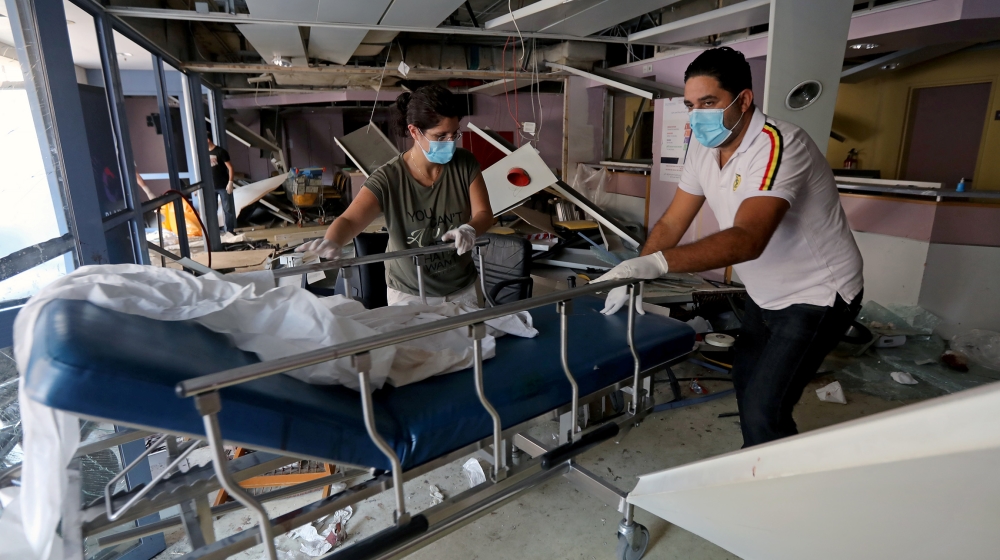
15:54 GMT – Bolsonaro says Brazil will send help to Lebanon
“Brazil is going to do more than a gesture, something concrete, to assist, in part, those tens of thousands of people who are in a very tough situation,” Brazilian President Jair Bolsonaro said at the end of a ministerial ceremony.
Bolsonaro said he had called the Lebanese ambassador to Brazil.
On leaving the ceremony, he told reporters that his government is in contact with representatives of the Lebanese community in Sao Paulo to decide what kind of aid will be sent. Bolsonaro said a military aircraft is available for transport.
15:46 GMT – Former parliamentarian calls for independent inquiry committee
Marwan Hamadeh, a former Lebanese member of parliament who resigned on Tuesday, said the United Nations Security Council should consider creating an international inquiry committee to investigate the blast.
His remarks come a day after the Lebanese government formed a special committee tasked with investigating the deadly blast. It is headed by the justice minister, the prime minister and the heads of major security agencies.
“Everybody has been appointed by the parties in power, and therefore, no judge is able to carry out an investigation on this really serious explosion,” Hamadeh told Al Jazeera.
“Never have we witnessed such a catastrophe,” he said. “No body wants to hear anything. We have this dictatorship … Hezbollah on one side, and the party of the president (Aoun) on the other.”
15:30 GMT – France opens probe into blast after 21 citizens wounded: prosecutors
Prosecutors in France opened an investigation after 21 French citizens were wounded in the devastating blast in Beirut, the Paris prosecutor said.
The prosecutors opened a probe into “involuntary injury” using their jurisdiction to investigate acts committed abroad, Paris prosecutor Remy Heintz said in a statement.
Heitz said an initial count had shown that 21 French citizens were wounded in the blast, which killed at least 113 people and injured some 4,000 others. Dozens remain missing.

15:16 GMT – #OurHomesAreOpen: Lebanese offer spare beds to Beirut blast victims
Using social media, hundreds of Lebanese have offered shelter in a bid to assist the some 250,000 displaced strangers.
Using the hashtag #OurHomesAreOpen in Arabic and English, social media users have freely offered up spare beds and empty properties to victims, providing their names, phone numbers and details on the size and location of the accommodation.
“I wanted to do something about it, I was going crazy,” said the founder of the platform ThawraMap, originally used to identify protest locations, which is curating a list of available beds, including free accommodation from hotels.
“Today, a lot more people are going to be homeless. They go to their family or friends for a day or two and then what are they going to do?” the anti-government activist told Reuters News Agency.
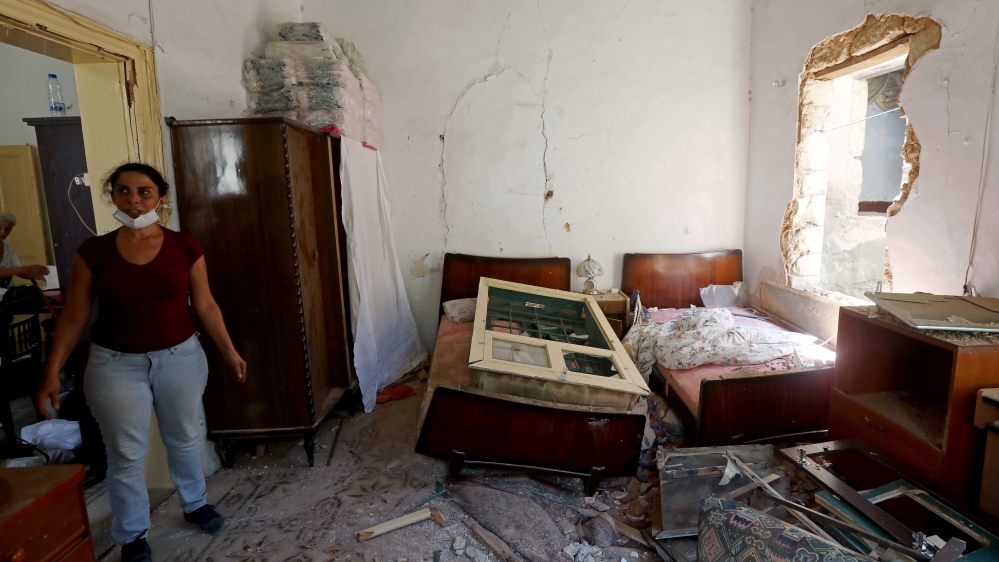
15:03 GMT – Turkey’s parliament speakers offers condolences
The head of the Turkish parliament offered his condolences to his Lebanese counterpart and expressed Turkey’s willingness to send help.
“Turkey has always stood by Lebanon. In this difficult period, we are ready to offer support and aid for Lebanon with every means available,” Mustafa Sentop told Nabih Berri in a phone talk, according to a statement.
For his part, Berri thanked Sentop for his call and said, “The friendship becomes evident in such hard times.”
14:55 GMT – Lebanon declares emergency in Beirut, approves urgent funding
Lebanon’s cabinet declared a two-week state of emergency in Beirut and handed control of security in the capital to the military.
The cabinet approved an exceptional allocation of 100 billion Lebanese pounds to deal with the crisis. The sum is notionally worth $66m based on the official exchange rate of 1,500 pounds to the dollar, but is effectively worth some $13m based on the latest rate on the parallel market, which stood at around 7,500 in the days before the explosion.
14:33 GMT – Information minister says army to oversee house arrests of port offiicals
Lebanon’s Information Minister Manal Abdelsamad said that the military would oversee the house arrest of those responsible for storage and guarding at the Beirut port since June 2014.
Abdelsamad told reporters that these poeople would be put under house arrest “as soon as possible” after their identities were determined by an investigative committee that was formed followinf the blast.
The committee is headed by the justice minister and includes the prime minister and the heads of major security agencies.
The house arrests would be done “within the next five days”, which is when the committe is expected to reveal its findings and hand them over to the judiciary.
13:45 GMT – Lebanon’s cabinet to place port officials under house arrest: government source
The Lebanese cabinet has decided to place port officials under house arrest until investigations determine who is responsible for the blast, a governmental source told Al Jazeera following an emergency session.
An official announcement is expected to be made shortly.
It was not clear how many officials would be included or their seniority level. According to Reuters News Agency, the army will oversee the house arrest of the officials who have overseen storage and security since 2014.
13:07 GMT – France’s president says he is traveling to Lebanon with rescue workers
French President Emmanuel Macron announced he would fly to Beirut, and two planeloads of French rescue workers and aid were expected to touch down on Wednesday afternoon.
Macron’s office told The Associated Press that the French leader will meet with Lebanese political leaders but provided no further details. Lebanon is a former French protectorate and the countries retain close political and economic ties.
Meanwhile, the EU commission said the plan is to urgently dispatch over 100 firefighters with vehicles, sniffer dogs and equipment designed to find people trapped in urban areas.
The Czech Republic, France, Germany, Greece, Poland and the Netherlands are taking part in the effort and other countries are expected to join.
Hello, this is Farah Najjar taking over from my colleague Linah Alsaafin.
12:30 GMT – What we know about deadly Beirut explosion, in 500 words
An initial large explosion in the port area of Beirut took place around 6:00pm local time (15:00 GMT) on Tuesday, resulting in a fire, several small blasts and then a colossal explosion that flattened the harbour front and surrounding buildings.
Seismologists measured the event, which blew out windows at the city’s international airport nine kilometres (more than five miles) away, as the equivalent of a magnitude-3.3 earthquake.
Read more here.
12:15 GMT – ‘Stay strong, Lebanon’: Global support over deadly Beirut blast
Emergency medical aid and pop-up field hospitals have been dispatched to Lebanon as the world offers its support and pays tribute to the victims of the huge explosion that devastated Beirut.
Lebanon’s Prime Minister Hassan Diab has called on “friendly countries” to support the nation already reeling from its worst economic crisis in decades as well as the coronavirus pandemic.
Gulf states were among the first to respond, with Qatar announcing it would send field hospitals to ease pressure on Lebanon’s strained medical system.
Read more here.
12:00 GMT – Beirut port head said explosive material was warehoused based on court order
Beirut port’s general manager said the facility had warehoused highly explosive material, blamed for the powerful blast that rocked Beirut, six years ago based on a court order, local broadcaster OTV reported.
The broadcaster quoted Hassan Koraytem as telling it that the customs department and state security had asked authorities for the material to be exported or removed, but that “nothing happened”.
11:45 GMT – Australia to donate $1.4mn to Lebanon
Australia says it will donate two million Australian dollars ($1.4m) in humanitarian support to Lebanon to help Beirut recover from Tuesday’s massive explosion.
Australian Foreign Minister Marise Payne says in a statement the money will go to the World Food Programme and the Red Cross to help ensure food, medical care and essential items are provided to those affected.
She says Australia and Lebanon have a strong relationship built on extensive community ties, and more than 230,000 Australians have Lebanese heritage.
An Australian was killed and the Australian Embassy in Lebanon was damaged in the explosion.
11:30 GMT – After blast, Lebanon has less than a month’s grain reserves
Lebanon’s main grain silo at Beirut port was destroyed in a blast, leaving the nation with less than a month’s reserves of the grain but still with enough flour to avoid a crisis, the economy minister said.
Raoul Nehme told Reuters a day after Tuesday’s devastating explosion that Lebanon needed reserves for at least three months to ensure food security and was looking at other storage areas.
“There is no bread or flour crisis,” the minister said. “We have enough inventory and boats on their way to cover the needs of Lebanon on the long term.”
He said grain reserves in Lebanon’s remaining silos stood at “a bit less than a month” but said the destroyed silos had only held 15,000 tonnes of the grain at the time, much less than capacity which one official put at 120,000 tonnes.
11:15 GMT – Lebanese president promises transparent inquiry into Beirut blast
Lebanon’s president said an investigation into a powerful blast that rocked Beirut would reveal the circumstances of what happened as soon as possible, and that the results would be revealed transparently.
In a televised speech at the start of a cabinet meeting, Michel Aoun also appealed to other nations to speed up assistance to Lebanon, which was already grappling with an economic meltdown.
“We are determined to investigate and reveal what happened as soon as possible, to mete out punishment,” Aoun said.
11:00 GMT – Lebanon blast ‘a real catastrophe’, analyst says
An analyst said Beirut’s massive explosion is like nothing he has seen in his life.
“This is a real catastrophe. What we’ve seen is cataclysmic,” Sami Nader, director of the Levant Institute for Strategic Affairs said.
“The magnitude, the impact of the explosion is beyond belief. I went through the civil war in Lebanon, I was witness to the [2005 former Prime Minister Rafik] Hariri bombing, to other bombings that targeted politicians, but nothing of this scale I have seen in my life.”
|
|
“The port is the major route of trade for Lebanon, the point where we get our wheat, our gas oil, our medicine – this infrastructure is totally destroyed. At the moment, we are in deep need of one single dollar to come into Lebanon.”
10:40 GMT – Pope Francis offers prayers for Beirut victims
Pope Francis has offered prayers for the victims, their families, and for Lebanon.
The pontiff appealed that “through the dedication of all the social, political and religious elements,” Lebanon “might face this extremely tragic and painful moment and, with the help of the international community, overcome the grave crisis they are experiencing.”
10:15 GMT – In Pictures: Beirut ‘like a war zone’ after deadly blast
Tuesday’s blast at port warehouses storing highly explosive material was the most powerful in years in Beirut, already reeling from an economic crisis and a surge in coronavirus infections.
“It’s like a warzone. I’m speechless,” Beirut’s mayor, Jamal Itani, told the Reuters News Agency while inspecting the damage on Wednesday that he estimated would cost billions of dollars.

See more here.
10:00 GMT – France sends rescuers, equipment to Lebanon
France will send two military planes to Lebanon with search and rescue experts, 15 tonnes of sanitary equipment and a mobile clinic equipped to treat 500 people injured in Tuesday’s monster blast at Beirut port, the presidency said.
The planes will leave from Charles de Gaulle airport outside Paris around midday (10:00 GMT) to arrive in Beirut late afternoon with 55 civil security personnel on board, it said.
A dozen emergency personnel will also be sent to Beirut shortly “to reinforce hospitals in the Lebanese capital,” said the presidency.
09:45 GMT – Beirut governor: more than 200,000 people lost their homes after blast
Marwan Abboud , the governor of Beirut, said ore than 200,000 people have become homeless after a massive blast at Beirut port destroyed many buildings.
Abboud told MTV news that between 200,000 and 250,000 people had lost their homes and authorities are working on providing them with food, water and shelter.
“We lost 10 members of the Beirut Fire Brigade and damages range between 3 [billion] and 5 billion dollars and maybe more,” he said.
The governor had revealed that a security report from 2014 warned of the possibility of an explosion in Lebanon’s capital as highly explosive materials had not been stored in a way to ensure public safety.
09:30 GMT – Turkish aid group helps Beirut victims, Ankara offers field hospital
Turkey’s Humanitarian Relief Foundation (IHH) is among those searching for survivors in Beirut, and Ankara has offered to build a field hospital and help as needed.
“We’ve relayed our offer to help … [and] we are expecting a response from the Lebanese side,” a senior Turkish official told Reuters.
Members of the IHH group were digging through debris to look for people and recover bodies, and the group mobilised a kitchen at a Palestinian refugee camp to deliver food to those in need, said Mustafa Ozbek, an Istanbul-based official from the group.
“We are providing assistance with one ambulance to transfer patients. We may provide help according to the needs of the hospital,” he said.
09:05 GMT – Pakistan voices solidarity with Lebanon after explosion
Pakistan’s prime minister on Wednesday expressed sorrow over loss of over 100 lives in a massive explosion that rocked Beirut.
“Deeply pained to hear of the massive explosions in Beirut with precious lives lost & thousand injured,” Khan said in a tweet. “We stand in solidarity with our Lebanese brethren in their difficult hour, sharing their sorrow & grief.”
Deeply pained to hear of the massive explosions in Beirut with precious lives lost & thousand injured.We stand in solidarity with our Lebanese brethren in their difficult hour, sharing their sorrow & grief. May Allah grant speedy recovery to the injured & strength to the bereaved
— Imran Khan (@ImranKhanPTI) August 5, 2020
08:45 GMT – Lebanese PM appeals for help after Beirut blast
Prime Minister Hassan Diab, in a short televised speech, has appealed to all countries and friends of Lebanon to extend help to the small nation.
“We are witnessing a real catastrophe,” he said, before reiterating his pledge that those responsible for the massive explosion at Beirut’s port will pay the price.
Diab also said it was “unacceptable” that a shipment of approximately 2,750 tonnes of ammonium nitrate – believed by authorities to be the trigger of the explosion – was stored in a warehouse in Beirut’s port for six years without safety measures.
08:15 GMT – What is ammonium nitrate?

Ammonium nitrate, which Lebanese authorities have said caused the devastating Beirut blast, is an odorless crystalline substance commonly used as a fertilizer that has been the cause of numerous industrial explosions over the decades.
When combined with fuel oils, ammonium nitrate creates a potent explosive widely used in the construction industry, but also by armed groups such as the Taliban for improvised explosives.
Under normal storage conditions and without very high heat, it is difficult to ignite ammonium nitrate. That is because it is an oxidizer – it intensifies combustion and allows other substances to ignite more readily, but is not itself very combustible.
Read more here.
07:45 GMT – Beirut blast: Tracing the explosives that tore apart the capital
It was only after a massive explosion ripped through Beirut that most people in Lebanon learned about the 2,750 tonnes of ammonium nitrate stored in a hangar at the city’s port.
However, analysis of public records and documents published online show senior Lebanese officials knew for more than six years that the ammonium nitrate was stored in Hangar 12 of Beirut’s port.
And they were well aware of the dangers it posed.
Read more here.
|
|
07:05 GMT – Iran offers to treat people injured in Beirut blast
Iran’s president has offered to send medical aid to Lebanon and treat people injured in the massive blast that killed at least 100 people in Beirut.
“Iran announces its readiness to send medical aid to Lebanon and also offers treatment of the injured and other necessary medical assistance,” Hassan Rouhani said, according to state TV.
“We hope that the circumstances of this incident will be determined as soon as possible and that peace will return to Beirut.”
06:45 GMT – UK says too early to speculate on cause of massive blast in Beirut
The United Kingdom has said it was too early to speculate on the cause of a massive blast that ripped through Beirut.
When asked about speculation about the causes of the blast, British junior education minister Nick Gibb said: “The Lebanese authorities are of course investigating the cause of that tragedy and before we have the results of that inquiry it is premature to speculate.”
Gibb also told Sky that Britain was discussing what technical and financial assistance could be offered to Lebanon.
05:55 GMT – Lebanese Red Cross death toll rises to more than 100
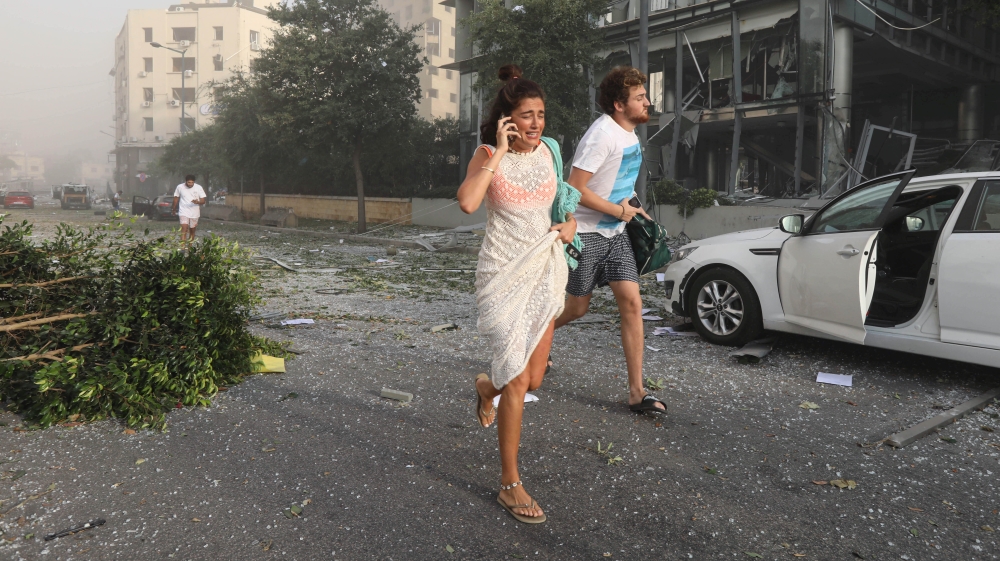
George Kettaneh, the head of the Lebanese Red Cross, has said at least 100 people were killed and more than 4,000 wounded in the massive explosion in Beirut on Tuesday.
Kettaneh added the toll could rise further, and that the Red Cross was coordinating with the health ministry for morgues to take victims because hospitals were overwhelmed.
Hello, this is Linah Alsaafin in Doha taking over from my colleague Ted Regencia.
05:40 GMT – Australia mourns Lebanon disaster, one national killed
Australian Prime Minister Scott Morrison confirmed on Wednesday the death of one Australian after a massive blast ripped through the Lebanese capital, Beirut.
“Our hearts go out to all of those in Lebanon and in Beirut in particular at the moment,” he said, adding that the Australian embassy had been significantly impacted.
Officials said they expect the death toll to rise further as emergency workers dig through the rubble to search for survivors.
05:20 GMT – Cyprus says ready to send medical teams to Lebanon
Cyprus says it stands ready to offer medical aid to neighbouring Lebanon after a massive explosion ripped through Beirut port, killing at least 78 people and injuring thousands, Reuters news agency reported on Wednesday.
Cypriot Foreign Minister Nikos Christodoulides told state broadcaster CyBCthe Cypriot embassy in Beirut, which was closed at the time of the blast, was badly damaged.
Tuesday’s explosion was heard throughout Cyprus, which lies more than 200km (124 miles) away.
04:50 GMT – India’s Modi ‘saddened’ by Beirut explosion
Indian Prime Minister Narendra Modi was “shocked and saddened” after learning of the large and deadly explosion that hit the Lebanese capital, Beirut, his office said on Wednesday.
“Our thoughts and prayers are with the bereaved families and the injured,” the prime minister’s office added.
It was unclear if there were Indian nationals affected by the blast that killed at least 78 people and injured about 4,000 others.
04:12 GMT – At least three Beirut hospitals destroyed, two damaged
Dr Mirna Doumit, president of the Order of Nurses in Beirut, said three of the city’s hospitals had been destroyed.
“So we had to evacuate patients who were in those hospitals to others. In addition, we have two other hospitals that were partially destroyed. So it was a catastrophe and a big hit to the healthcare system, which was already bleeding,” she told Al Jazeera from the Lebanese capital.
“We lost three nurses working in the hospitals. I don’t find words to describe what happened. It’s like we are in a horror film.”
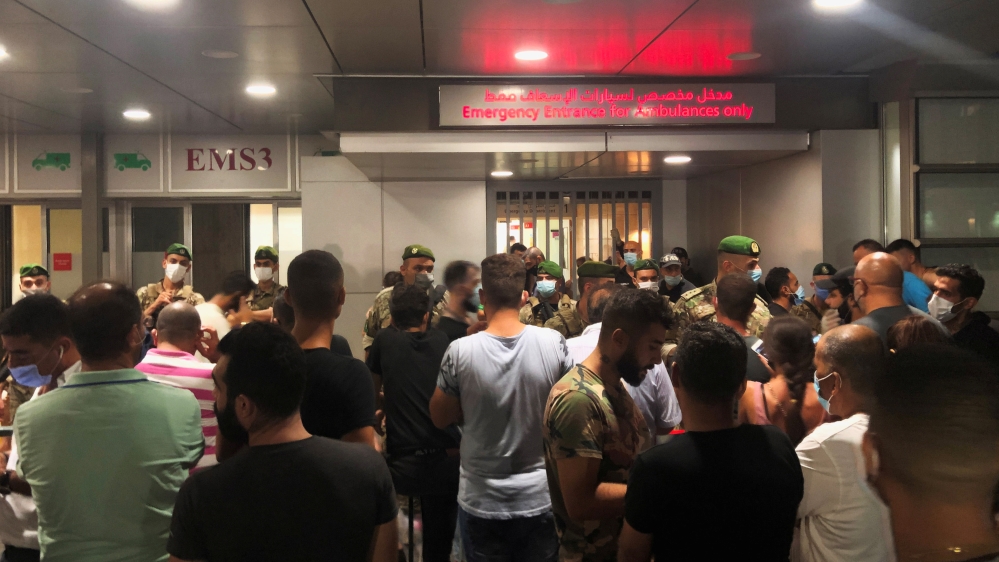

04:01 GMT – Analyst: Lebanon needs international help to deal with disaster
Nasser Yassin, professor at the American University of Beirut, told Al Jazeera he doubts the Lebanese government will be able to deal with this disaster on its own and called on the international community to provide food support, noting major grain silos had been destroyed in the blast.
“We’ve seen the Lebanese government not taking the right decisions when it comes to the economy, or finances or social issues. And I can imagine that this disaster, this catastrophe, will be dealt by the way Lebanese people do – relying on themselves and the support of their communities,” he said.
“For the coming days and months, we will be dealing with the immediate aftermath, and after that, we really need to look into new ways and new people to govern this country,” he said, adding: “We need more responsible leaders and we need the engagement of the international community to deal with this disaster.”
03:00 GMT – Malaysia offers to help ‘in any way we can’
Malaysian Foreign Minister Hishammuddin Hussein expressed his country’s grief over the Beirut blast, and offered to help in “any way we can”.
“Malaysia stands together in grief as our thoughts and prayers accompany the strong people of Lebanon,” he said in a Twitter post. “We stand ready to support any way we can.”
Malaysia stands together in grief as our thoughts and prayers accompany the strong people of 🇱🇧 Lebanon. We stand ready to support any way we can. Initial reports from our @MYEmbBeirut show that all Malaysians there are safe and have been advised to stay at home #PrayForLebanon pic.twitter.com/tpJJ8HAo5x
— Hishammuddin Hussein 🇲🇾 (@HishammuddinH2O) August 5, 2020
02:25 GMT – At least two Filipinos among the dead
At least two Filipino nationals were among the dead in the massive explosion in Beirut, according to the Philippine Embassy in Lebanon.
The embassy statement also said six other Filipinos were injured in the blast.
More than 27,000 Filipinos are working in Lebanon, according to the latest figures of the Philippine Department of Foreign Affairs.
02:12 GMT – Customs office blames Beirut port chief for storage of explosives
Badri Daher, the director of Lebanon’s customs office, said his agency was not responsible for the ammonium nitrate stores that triggered a massive explosion that left dozens dead.
In an interview with Al Jazeera, Daher pointed the finger instead at Hassan Koraytem, head of the port.
Koraytem could not be reached for comment. The Port Directorate is under the authority of the Public Works and Transport Ministry.
01:40 GMT – Beirut explosion triggers 3.5 earthquake
The massive explosion in Beirut triggered a 3.5 magnitude earthquake, according to Germany’s geosciences centre GFZ.
The explosion, which killed at least 78 people and injured about 4,000 others, was heard and felt as far away as Cyprus more than 200km (124 miles) away across the Mediterranean.
00:01 GMT – Lebanon defence council recommends army oversee Beirut’s security
Lebanon’s Supreme Defence Council recommended declaring a two-week state of emergency in the capital and handing over security responsibility to military authorities.
A council statement, read live on television, said President Michel Aoun has decided to release 100 billion Lebanese pounds ($66m) in emergency allocations from the 2020 budget.
It also recommended, in advance of a Cabinet meeting on Wednesday, that a committee be tasked with investigating the explosion and present its findings within five days to mete out the maximum punishment to those responsible.
|
|
____________________________________________________________
Hello and welcome to Al Jazeera’s continuing coverage of the massive explosion in Beirut, Lebanon. I’m Ted Regencia in Kuala Lumpur, Malaysia.
For other key developments related to the Beirut explosion from yesterday, August 4, click here.